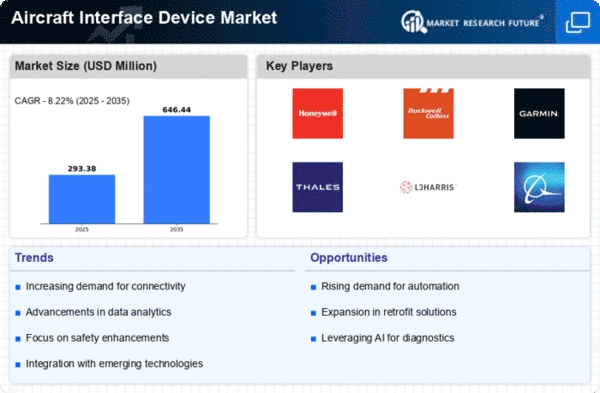Top Industry Leaders in the Aircraft Interface Device Market

Key companies in the market include:
Astronics Corporation
Collins Aerospace
Elbit systems ltd
MAN
PACCAR Inc
Honeywell International Inc
SCI Technology, Inc.
Skytrac Systems Ltd.
Thales
Boeing
Teledyne Controls LLC
Anuvu
Strategies Adopted
Industry news within the Aircraft Interface Device market reflects ongoing trends, regulatory changes, and the sector's response to the evolving requirements of airlines, aircraft manufacturers, and aviation authorities. News related to successful AID installations, collaborations with avionics providers, and advancements in cybersecurity for data communication showcase efforts to enhance system performance and operational efficiency. Moreover, developments in AID applications, such as the integration of real-time weather updates, electronic flight bag functionalities, and connectivity for in-flight entertainment, are frequently covered in industry news, reflecting the industry's commitment to staying at the forefront of aviation technology.
Current investment trends in the Aircraft Interface Device industry underscore a dual focus on research and development and strategic partnerships. Key players are directing investments towards improving AID cybersecurity features, exploring new applications for in-flight connectivity, and collaborating with avionics providers for system standardization. Investments in digital infrastructure, compliance with evolving aviation regulations, and the development of open architecture solutions are prevalent, reflecting the industry's adaptation to the growing emphasis on data security and interoperability. Additionally, strategic investments in acquisitions and partnerships aim to strengthen market presence and enhance the overall capabilities of Aircraft Interface Device providers.
Emerging Companies
The overall competitive scenario in the Aircraft Interface Device market is characterized by established brands and dynamic newcomers, each navigating the industry with distinct strategies. Market share analysis considers factors such as system compatibility, cybersecurity features, and the ability to offer integrated solutions for diverse aircraft types. The industry's responsiveness to technological advancements, regulatory changes, and the integration of AID systems with existing avionics further shapes competitiveness. As aviation stakeholders increasingly prioritize connectivity, data security, and operational efficiency, the Aircraft Interface Device market is poised for continued growth. Companies in this sector are striving to balance innovation, quality, and affordability to maintain a competitive edge in a complex and rapidly evolving aviation technology landscape.
Recent News
Thales Group (France):
TopCockpit® Integration with AIDs: Thales is integrating its advanced TopCockpit® avionics suite with its aircraft interface devices (AIDs), creating a unified system for enhanced pilot situational awareness and control. This improves flight deck efficiency and simplifies operation.
Focus on Cybersecurity: Thales prioritizes cybersecurity in its AIDs, implementing robust measures to protect against cyberattacks and unauthorized data access, vital for critical flight systems.
Honeywell International Inc. (USA):
Smart AIDs Development: Honeywell actively develops "smart" AIDs equipped with artificial intelligence (AI) and machine learning capabilities. These devices can process vast amounts of data and provide pilots with proactive alerts and recommendations, boosting safety and optimizing performance.
Expansion into New Markets: Honeywell expands its AID offerings beyond commercial aircraft, targeting military and special mission planes to cater to diverse operational needs.
Collins Aerospace (USA):
Connected Aircraft Health Monitoring (CAHMS) Integration: Collins Aerospace integrates its CAHMS system with its AIDs, enabling predictive maintenance and real-time troubleshooting of onboard systems, ensuring operational efficiency and minimizing downtime.
Focus on User Experience: Collins Aerospace prioritizes developing user-friendly interfaces for its AIDs, making them intuitive and easy to operate even for less experienced pilots, minimizing pilot workload and stress.
Astronautics Corporation of America (USA):
Focus on Niche Markets: Astronautics specializes in AIDs for specialized aircraft like helicopters and business jets, providing tailored solutions catering to their unique operational requirements and challenges.
Military AID Expertise: Astronautics enjoys success in the military AID market, offering reliable and secure systems for military aircraft and special mission platforms.
Esterline Technologies Corporation (USA):
Acquisition by Collins Aerospace: In 2020, Collins Aerospace acquired Esterline Technologies, incorporating its AID expertise and product portfolio into their offerings, strengthening their position in the market.
Focus on Legacy Systems: Collins Aerospace continues to support and upgrade Esterline's legacy AID systems, ensuring continued operation and safety for older aircraft models.
Emerging Trends in Aircraft Interface Devices:
Increasing adoption of AI and machine learning for smart AIDs and enhanced decision support.
Integration with avionics suites and other onboard systems for a unified and efficient cockpit environment.
Focus on cybersecurity and robust data protection measures for critical flight systems.
Development of user-friendly interfaces and intuitive controls to reduce pilot workload and improve operability.
Tailored solutions for specific aircraft types and operational needs, particularly in niche markets.











